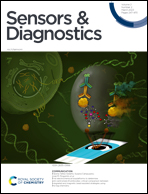The design of anti-fouling and anti-hydrolysis cyclic peptides for accurate electrochemical antigen testing in human blood†
Abstract
Antigen testing is an effective methodology for COVID-19 disease screening, and the receptor-binding domain of the SARS-CoV-2 spike glycoprotein (RBD) is recognized as a key biomarker for the diagnosis, treatment, and vaccination of COVID-19. However, the diagnosis of RBD directly in human biofluids remains a serious challenge owing to severe biological fouling in real samples. Herein, a sensitive electrochemical biosensor capable of detecting the RBD antigen in human blood was constructed based on a self-designed cyclic peptide. This cyclic peptide was designed to have good antifouling properties to resist nonspecific adsorption of proteins, etc. in blood, and the cyclic structure of the peptide was able to resist enzymatic hydrolysis by certain enzymes in blood, enhancing the stability of the peptide as well as the peptide-based biosensor. Compared with conventional linear peptides, the cyclic peptide possessed better antifouling properties and a much stronger anti-enzymatic hydrolysis ability. The electrochemical biosensor based on the cyclic peptide was capable of sensitively assaying RBD in the concentration range from 1.0 pg mL−1 to 100.0 ng mL−1, with a limit of detection of just 0.45 pg mL−1. Moreover, the biosensor was able to quantitatively detect RBD in real samples, and the results were more reliable than those measured with ELISA kits, especially in human blood with higher concentrations. This strategy of designing cyclic peptides for the construction of antifouling biosensors offered a new method for clinical detection of viral antigens in complex biological media like human blood.



 Please wait while we load your content...
Please wait while we load your content...